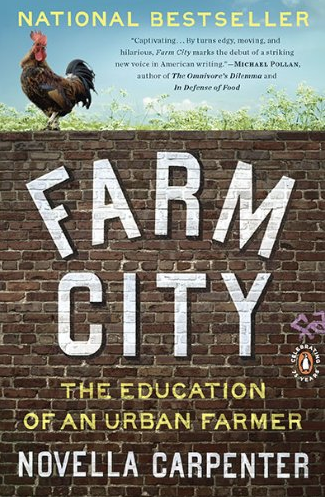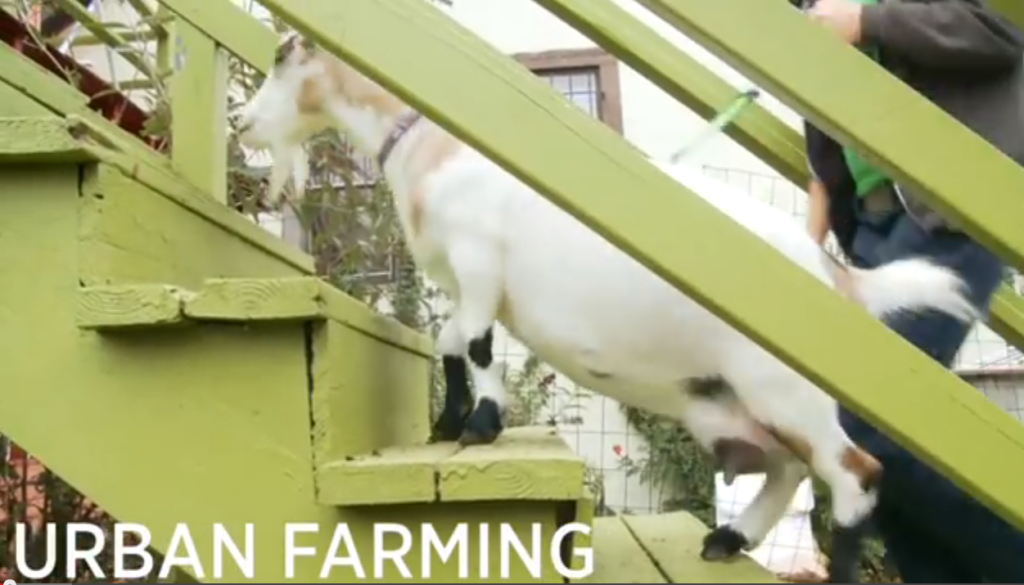 A COUPLE OF WEEKS AGO I FILMED NOVELLA CARPENTER, author of “Farm City: The Education of an Urban Farmer.” Michael Krasny, the host of KQED’s “Forum” program, led the conversation with Novella. It was a full house in Dominican University of California’s Angelico Hall because Carpenter’s 2009 book was selected as the book for this year’s One Book, One Marin. The county library and other libraries in Marin all focused on reading and discussing “Farm City,” and the culminating event was hearing the author on April 30.
A COUPLE OF WEEKS AGO I FILMED NOVELLA CARPENTER, author of “Farm City: The Education of an Urban Farmer.” Michael Krasny, the host of KQED’s “Forum” program, led the conversation with Novella. It was a full house in Dominican University of California’s Angelico Hall because Carpenter’s 2009 book was selected as the book for this year’s One Book, One Marin. The county library and other libraries in Marin all focused on reading and discussing “Farm City,” and the culminating event was hearing the author on April 30.
If you don’t know about her, Novella Carpenter is truly a very funny and bright writer who was raised by parents committed to a “back to the Earth” lifestyle. As an adult, she and her partner chose to live in very challenging West Oakland. Once they had moved in, the abandoned lot near her apartment called to her. She said, “I have a tendency to get myself embroiled into projects without thinking about the consequences . . . and then deal with it.” Not only did she raise vegetables and plant fruit trees, she kept bees and raised chickens, turkeys, rabbits, goats and pigs.
“Once you start gardening, you realize how little you do know,” she said. Friends would ask, “Why don’t you just live in the country?” but she found she could raise animals in the city from the waste stream, i.e., by Dumpster diving for wilted or unused vegetables and fruits to feed her rabbits, geese and chickens.
Bees — an urban farming gateway project
 In her sassy talking and writing style, Carpenter described keeping bees as a “gateway project” that led her — and she hopes others — to more ambitious farming projects. “The next thing you know,” she said, “you have a pig in the backyard.”
In her sassy talking and writing style, Carpenter described keeping bees as a “gateway project” that led her — and she hopes others — to more ambitious farming projects. “The next thing you know,” she said, “you have a pig in the backyard.”
She said that as a farmer, you deal with reality all the time. In her book, she reveled in the joy of beekeeping and extracting honey. Once you start doing things like that, she said, “you are more engaged in the world.”
The pleasure of the table
Much of Carpenter’s conversation with Michael Krasny and in her book recounted the pleasure of looking out the window and planning what she would feed her family that day. She wrote, “I plucked an apple and a few plums, and made plans for lunch. The pumpkins were still small but numerous; I yanked the smallest from the vine . . . . I’d shred it and make pumpkin hash browns . . . . I crouched near the zucchini plants and examined them . . . . There was an abundance of the yellow-orange flowers . . . . I dredged each of the flowers in egg, dipped them in cornmeal, then fried them.”
Challenges of the urban farm
Not only did Novella choose to live in West Oakland, she also created an urban farm under the most challenging conditions. Would the vacant lot be reclaimed and redeveloped? Would opossums or raccoons kill her poultry? Would there be any fruit left in the garden for her family after neighbors pillaged it? Would there be any violence on her street? Would her vegetables make it to harvest? And in addition to drought, she also had to grapple with the soil being toxic from lead paint chips and the deterioration of area buildings.
Back home in Benicia
We are most fortunate not to have the challenges of West Oakland in our city or Community Gardens.
For myself, I am in my third planting of my raised beds, and I have enjoyed spring lettuce, radishes and delicious peas. The peas are prepared nearly immediately by shelling and boiling in water for one minute, draining and dressing with just a touch of butter — ambrosia! Now the garden has green beans at 4 inches, new spinach shoots are showing and the three tomato plants are looking very good. I’m keeping the cold frame covers on to conserve water in the two raised beds and I’m hopeful, as any gardener is, that those tomatoes will fill a summer sandwich.
Benicia Community Gardens are looking particularly abundant at the moment. I know we are very blessed to have them in our town. Many of the Community Gardeners are on hand on Thursdays to talk as we mosey down to the Farmers Market, which itself hosts fresh fruits, vegetables, eggs, pasta, honey and other fantastic culinary temptations.
We also have a variety of Community Supported Agriculture farms serving Benicia. I am a member of the Terra Firma CSA, and for $15 a week I enjoy a cornucopia of fresh food. In fact, tonight I’m going to cut those red kale leaves in pieces, toss them in olive oil and some seasoning, heat the oven to 350, and place them on an olive oil-greased cookie sheet for 10 minutes for crispy kale chips. Delicious!
While it’s possible to raise chickens in Benicia (no roosters), we still can’t maintain beehives. Certainly it’s time to change the ordinance and welcome these productive “gateway” creatures into our community.
Bee nice, Benicia!
Learn more
• Novella Carpenter at Dominican: youtube.com/watch?v=6V80ETmcFfA&feature=share&list=PLD77AA7538596A6BD
Constance Beutel is the chair of Benicia’s Community Sustainability Commission. She is a university professor and videographer and holds a doctorate from the University of San Francisco.







Leave a Reply